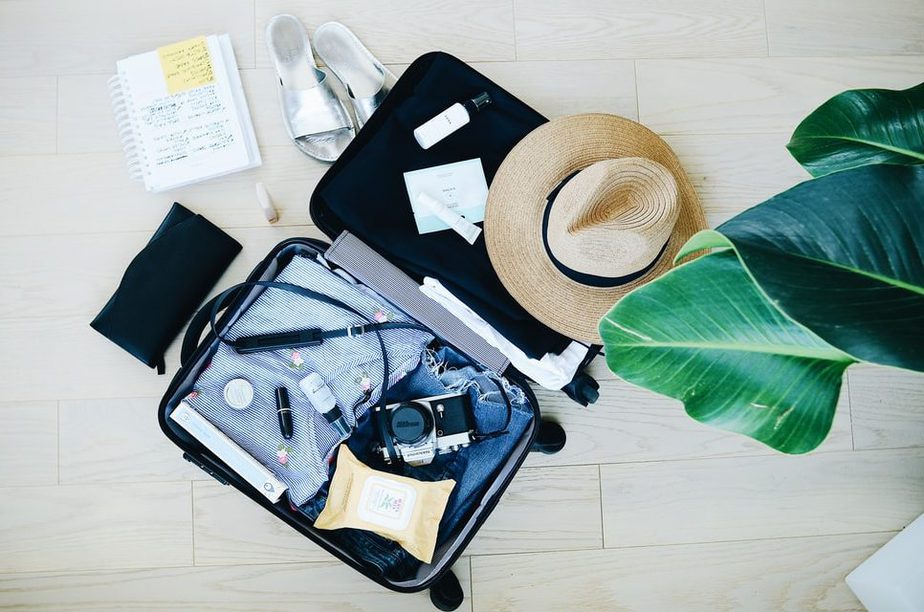

Vlad Dzhashi, MD
Did you know that I am a “reluctant” locum tenens traveler?
Yes, I’ve traveled a lot, but I’ve always preferred not to do it.
Oddly enough, my reluctance made me look for ways to have a hassle-free travel experience.
So today the time has come for me to share what I’ve learned in 6+ years of driving, flying, and staying at hotels and apartments all over America while working locum tenens.
You will not only learn how to travel with comfort but, most importantly, how to stay in the best mental and physical state despite living out of a suitcase.
If you are working locum tenens now or plan on doing it, you simply CANNOT miss this stuff!
Let’s jump right in…
Table of Contents
TSA precheck
Let’s start with the basics.
If you fly more than a few times a year (most docs working locum tenens docs do), TSA precheck is a MUST.
With the TSA precheck, you can save hours of your precious time at the airport.
You don’t have to wait in lines going through security checkpoints and you’ll have extra time before your flight since you can come to the airport as late as one hour before your flight’s departure.
TSA precheck is a no-brainer: it costs $85 and takes only a couple of weeks to get approved after you’ve submitted your application.
Onward.
- TSA precheck is a MUST for a hassle-free airport experience
Comfortable stay
Staying comfortably is the most important part of your travel, and I’ve picked up a few hacks over the years.
👉 How to vet quality hotels
One key lesson I’ve learned is not to rely only on star ratings since some 3-star hotels are no better than motels.
The best way to vet hotels is to look them up on TripAdvisor. I would avoid any hotel that has a rating of less than 4 out of 5.
Also, check out the “travelers” photo section to get an idea of what to expect.
👉 Step up your game: sweet stay in a suite
When you stay in a suite, you don’t just have more space, you are guaranteed to have a better sleep.
Think about it: your bed and the hallway are separated by two doors, which removes some of the noise coming in.
So do not hesitate to ask your staffing company to provide you with this “extra,” as the price difference is only about $20-40/night.
In my experience, no locum tenens agency ever refused. But, even if they do, I would pay out of pocket. It will cost about $200-400 for a week but it is totally worth it.
👉 Pick your room like a pro
Not only do you need to stay in a more spacious room, it is a good idea to pick your room’s location.
Make sure to call the hotel reception a few days in advance and let them know your preferences: you want to stay on the highest floor possible, far away from the elevator and also facing off the road.
If they cannot satisfy all these requirements, at the very minimum you should avoid the ground floor like the plague: you’ll be annoyed by cars, lights, people talking, etc.
This makes even more sense if you work night/evening shifts and need to sleep during the day.
Long stay = Airbnb or furnished apartment
Now, if your locum tenens gig is longer than a couple of weeks at a time, I would recommend staying at the “home-like” settings.
Renting Airbnb or furnished corporate apartments would be better options. Just make sure to read my locum tenens housing post where I show you how to avoid trouble with those.
- Vet your hotels on the Tripadvisor
- Stay in a suite
- Stay on the highest floor possible, ideally as far from the elevator as possible and your room should NOT be facing the road
- For longstays, Airbnb or furnished apartments will be better options
Packing
Never spend more than 5 minutes getting ready for your travel
Packing my stuff used to be a huge time-waster for me. Over the years, I figured out a way to make it short and sweet.
Here’s a trick: to pack quickly, UNPACK as little as possible after you are back home from your trip.
Basically, the only thing that you remove from your suitcase is your laundry. Everything else should stay THERE e.g., toiletries, gym shoes, utensils, thermos, lab coat, stethoscope, pager, and badge, etc.
This way it will only take you a few minutes to pack your clean clothes and you are good to go.
- to pack quickly, UNPACK as little as possible
Healthy Food
“Treat your body like a mansion, not a woodshed….”
I don’t need to explain what a difference healthy nutrition can make. Having said that, it’s easier said than done, especially when you are away from home.
There’s always a temptation to eat hospital cafeteria food: it is easily available and it may even be free.
The problem is that I am yet to find a hospital where you can find healthy choices.
Here are a few tips that will help you to cook your own meals while traveling as a locums.
Your own kitchen:
First, get a hotel room with a kitchenette. The fact that you’ve got everything you need to cook will leave you with no excuses, and you will be more likely to stay on the “right track” with a healthy diet.
If no hotel in the area has this amenity, at least make sure your room has a fridge with a freezer.
Take care of groceries FIRST:
Second, swing by the grocery store BEFORE you check in to the hotel. Again, you’ll have no excuses not to cook your own meals.
Instant Pot:
And, finally get this guy on your team:
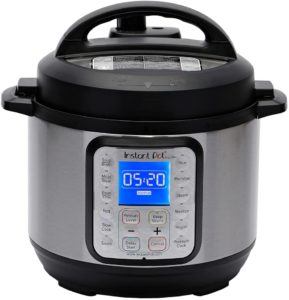
INSTANT POT!
The Instant Pot is truly a “magic” machine that costs about 100 bucks, weighs 9 lb (hence it can be easily put in your luggage), and can cook healthy meals in a matter of minutes (this is not an exaggeration!!!).
In fact, it is much quicker than ordering through DoorDash or driving to the restaurant (another excuse not to cook is destroyed).
What do I make in it?
My meals usually consist of 3 components – protein (meat or fish), greens, and a little bit of complex carbs (typically beans, lentils, quinoa, or sweet potatoes).
That said, this “magic pot” can make great and healthy meals fast no matter what your preferences and dietary restrictions are.
- Healthy food = food you’ve cooked
- Get a hotel room with a kitchenette
- Do grocery shopping before checking in to the hotel
- Buy the Instant Pot
Dealing with jet lag
You may think that unless you travel from Hawaii to the East Coast, the jet lag would not be a problem.
But, from what I’ve noticed, even one hour difference can mess me up physically and mentally. I simply don’t have as much energy and feel “foggy.” It takes a good two to three days to get over it.
Here are a few tricks that worked well for me and will help you to get up to speed.
First, limit your caffeine to one cup in the morning the day of your flight.
Second, try to work out in the morning before your shift starts. It doesn’t have to be hard or long. Working out for as little as 10-15 minutes is more than enough to get your internal “clocks” on the right track.
If you don’t feel like doing any exercise, at least take a quick walk outside.
The third is a neat hack that will work like a charm if you are willing to drop $200 on this portable lightpad.
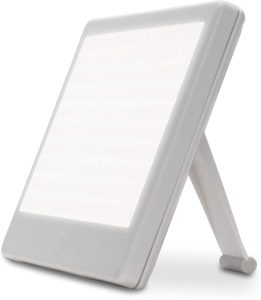
This compact lamp generates a very bright light, simulating natural sunlight. You put it at the bedside and turn it on in the morning as soon as you wake up.
I’ve noticed it resets my “clocks” even better in the wintertime when mornings are dark and gloomy.
- Limit your caffeine the day of your travel
- Exercise or take a walk in the morning before your first shifts starts
- Use lightpad in the morning to reset your circadian rhythm
Onward.
Winter driving
Winter driving deserves special mention.
You see, if you ever work in the Northeast, Midwest, or any mountainous areas in the winter, you better be prepared.
Personally, I’ve made a lot of trips across the Washington state’s mountain passes and I know this can be pretty tricky.

The key here is to have a reliable car that would make your driving seamless.
First, your car MUST be an SUV or a truck and it has to be all-wheel drive. You’ll be surprised but some of these cars are front or rear-wheel drive only.
Second, at the very minimum, your rental should have all-season tires, and, ideally, special winter tires, as most rental companies prohibit you from using chains on their cars.
Hertz seems to be the only company that offers a winter tire package, but other agencies may have a few available cars with winter tires as well. The best thing to do is to give them a call and find out.
If you work with a locum tenens company’s travel agent, have them do the calling and double-check for you.
Now, the staffing agency may push back on your request, as SUVs are usually more expensive to rent. If this happens, tell them you don’t feel safe driving in the snow and explain you may not make it on time for your assignment due to the weather conditions unless you drive an SUV.
And finally, when picking up your rental, make sure to actually look at your tires. You should see one of these signs on your tires.
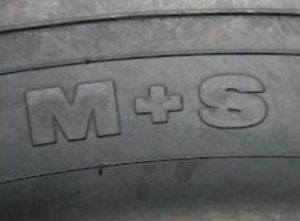
“Ok” option – “All-season” tires

The best option – proper winter tires.
- Drive All wheel drive SUV or truck
- Make sure your car has winter (best option) or all-season (Ok option) tires
- When picking up your car, look at signs on your tires to double check
Beating“cabin fever”
“Cabin fever” is real!
Just imagine…you are away from home, from your usual circle of friends and family, your favorite hobbies, activities, sometimes for months and months on end.
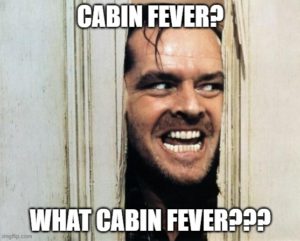
No wonder some of the locum tenens docs (myself included) start feeling lonely, isolated, and cut off from the world.
Fortunately, the solution is very simple: you MUST GET OUT of your hotel room and go places.
Just walk outside in the park, hike in the woods and breathe some fresh air, drive around a little bit, or even better…socialize with other docs.
The key is to change the environment and your surroundings when you are off work to keep your “battery” charged and stay sane.
- The best ways to prevent and beat cabin fever: GET OUT OF YOUR HOTEL, change the scenery, socialize with other people
Wrap up
That’s all I wanted to say for now! Comment below if you’ve got any other helpful tips for locum tenens travelers.
As featured on






Great post 📫
Thank you! I’m glad you liked it.
Great post 🔥